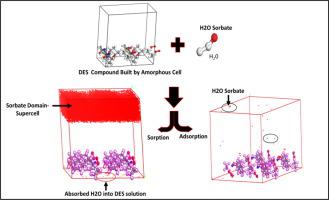Journal of Molecular Liquids ( IF 5.3 ) Pub Date : 2021-09-11 , DOI: 10.1016/j.molliq.2021.117493 Hussain H. Al-Kayiem 1 , Temidayo L. Oladosu 1 , Syed I.U. Gilani 1 , Aklilu T. Baheta 2

|
Non-biocompatibility, volatility, toxicity, and corrosiveness are associated with conventional working fluids in heat and mass transfer systems. These issues can be mitigated using binary deep eutectic solvent (DES) fluids. This study aims to characterize and evaluate different DES as bio-working fluids. Eleven binary DES samples were prepared by mixing different ratios of compounds and then classified into four groups. Group DES A was developed from C5H14ClNO and (CH2OH)2, DES B from C6H16ClNO and (CH2OH)2, DES C from C8H15ClN2 and ZnCl2 (CH2OH)2, and DES D from C8H15ClN2 and (CH2OH)2. The molecular structures of each category of binary DES were built using the BIOVIA material studio software 6.0 (ACCELRYS). The samples' molecular dynamics, rheology and physiochemical properties were numerically evaluated to predict the material's profile. The chemical fingerprint, inter-molecular behavioral properties, functional groups, rheology, thermal stability, conductivity, electrophoretic properties, and possible emissions at elevated temperatures of the samples have been evaluated. The measured viscosities of the eleven samples, between 0.015 and 0.04 Pa∙s are low compared to conventional ionic liquids and some nanofluids reported in the literature. The average thermal conductivity of the investigated binary DESs was between 0.228 and 0.17 W/m·K at 25 °C. Group DES C thermally decomposes after 350 °C, while other DESs exhibited thermal stability until about 150 °C. Additionally, toxicity analyses of the DESs revealed their bio-friendliness. This property is owed to the emitted compounds with health benefits, including triacetin, procainamide, monoacetate, and 2, 2 difluoroethyl acetates, witnessed at 250 °C of injection temperature.
中文翻译:

作为传热和传质系统中生物相容性工作流体的二元深共熔溶剂的分子动力学
非生物相容性、挥发性、毒性和腐蚀性与传热和传质系统中的常规工作流体有关。使用二元深共熔溶剂 (DES) 流体可以缓解这些问题。本研究旨在表征和评估不同的 DES 作为生物工作液。通过混合不同比例的化合物制备 11 个二元 DES 样品,然后分为四组。DES A 组由 C 5 H 14 ClNO 和 (CH 2 OH) 2发展而来,DES B 由 C 6 H 16 ClNO 和 (CH 2 OH) 2 发展而来,DES C 由 C 8 H 15 ClN 2和 ZnCl 2 发展而来(CH 2 OH) 2,以及来自 C 8 H 15 ClN 2和 (CH 2 OH) 2 的DES D。使用BIOVIA材料工作室软件6.0(ACCELRYS)构建每一类二元DES的分子结构。对样品的分子动力学、流变学和理化特性进行数值评估,以预测材料的轮廓。已经评估了样品的化学指纹、分子间行为特性、官能团、流变学、热稳定性、电导率、电泳特性以及在升高的温度下可能的排放。与传统离子液体和文献中报道的一些纳米流体相比,11 个样品的测量粘度在 0.015 到 0.04 Pa∙s 之间较低。所研究的二元 DES 的平均热导率在 25°C 时介于 0.228 和 0.17 W/m·K 之间。DES C 组在 350 °C 后热分解,而其他 DES 直到约 150 °C 才表现出热稳定性。此外,DES 的毒性分析揭示了它们的生物友好性。这种特性归因于释放的具有健康益处的化合物,包括三醋精、普鲁卡因酰胺、单乙酸酯和 2, 2 二氟乙酸乙酯,在 250 °C 的注射温度下观察到。











































 京公网安备 11010802027423号
京公网安备 11010802027423号